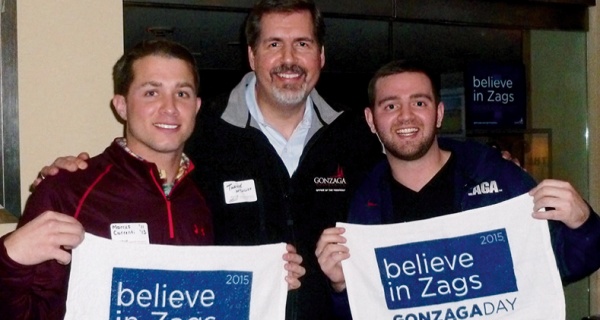By Thayne M. McCulloh, D.Phil., President
Do you believe in Zags? This question was posed during Gonzaga Day celebrations in January, but it is also the question, answered in the affirmative literally thousands of times a year by students and their families, by generous alumni and supporters, and by our Jesuits, faculty and staff.
It seems a particularly important question to ask and to reflect upon now. For decades following World War II, our nation saw a veritable explosion in the number of college-going students and, in turn, incredible growth in the number and size of higher education institutions. Support for students and pursuit of a college education (and the economic growth and development that follows) were at the top of the federal government’s list of priorities.
Over the past 20 years, in ways both highly visible and barely noticed, the world of higher education has changed substantially. Technological advances have created new modes for delivering education, and a plethora of new educational opportunities has resulted in greater competition for students among “traditional” institutions.
Despite these shifts, several important things have not changed. The world still needs well-educated, intelligent, creative, ethical and hard-working women and men who feel a sense of responsibility to positively impact their communities.
The Catholic Church, in large part through the work of the Society of Jesus, continues to depend upon its universities to educate people — through word and example — about the Gospel and the teachings of the Church. Even as our task is to “stretch” our students intellectually and socially, we also challenge them to grow in a mature understanding and appreciation of their faith.
At Gonzaga, we continue to believe that a major part of our educational mission is to teach students not only about the art and science of learning but also to create an experiential context wherein students grow in their appreciation for what it means to be kind, decent and constructive members of a community. There is no substitute for living together with people very different from oneself to gain competency in social skills that have lifelong benefits.
Our commitment to sustaining this mission is evidenced by recent dialogue at the federal and state level regarding budget proposals and numerous regulatory actions. We must raise questions about the fundamental purpose of higher education in our country: are colleges and universities developers of human potential and incubators of opportunity, or — as some would suggest — merely expensive enterprises with questionable “return on investment”?
In my view, a narrow paradigm does not do justice to the full value, and impact, of a Gonzaga education. Based upon surveys and the testimony of our graduates, gaining employment — specifically field-related employment — is not an enormous challenge; but neither is it a sufficient criterion for success. Our alumni talk about the importance of the relationships they developed with their faculty and peers, and the meaning those relationships have had over the course of their lives. They speak of the experiences while at Gonzaga that made an indelible mark on their hearts, forever changing their understanding of the meaning that selfless acts of generosity can have. They reference the power of spiritual retreats as rooting their adulthood in an active life of faith.
Making, and keeping, Gonzaga successful in this new higher education environment will continue to demand agility and constant innovation. The challenge we face, ever and always, is understanding our educational needs, finding new and distinctive ways to meet them, and maintaining our Jesuit, Catholic and humanistic mission. This is the core of the Gonzaga experience that has benefited and served our graduates so well.
So — do you believe in Zags? If you are reading this, the chances are very good that you do, and we thank you. We will work every day to justify your belief. May the Holy Spirit continue to bless and guide you, now and forever.
